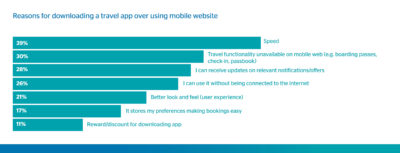
Travelers now prefer travel apps to web for search and booking
By cameron in Uncategorized
This is a viewpoint from David MacHale, digital marketing director, Travelport Digital.
Travelers have gone all Shania Twain on us recently. To steal a line from her ‘90s classic, travelers might as well be humming: “So you’ve got a new mobile-friendly website?…That don’t impress me much!”
Travelers expect travel brands to deliver a great mobile experience. Much like the former Queen of Country-Pop, if you’re not living up to their standard, they won’t be returning anytime soon.
What exactly do we mean when we say mobile?
Up until recently “mobile” really meant either mobile apps, found in places like the App Store, or mobile web, accessible via URLs. What we see now is that travelers are increasingly turning to the app experience, rather than mobile web, to search and book flights and accommodation.
A global study Travelport Digital carried out with 955 end travelers showed that 58% of people prefer apps to search for flights and 53% preferred apps to find accommodation. We found that consumers want a lightning-fast mobile experience, which they feel this is best delivered through apps. Travelers also value the additional functionality and features that the native platforms bring.
Travel brands that can match their app experience to consumer expectations will drive more bookings, add more ancillaries and create longer-term value. And those travel brands that don’t deliver will suffer through online cart-abandonment, as well a pummeling on social media and app store ratings.
Our research reveals what travel activities people use apps for and why they consider choosing apps ahead of mobile web. The research highlights the opportunities for travel brands to engage through the customer journey.
Reasons travelers prefer apps versus web
The findings revealed that apps remain the ‘go to’ for traveler engagement. In many respects, native apps are the preferred channel over web due to their speed, additional functionality, and better overall UX.
Rather than showing signs of ‘app fatigue’ now seen in other industries, travel apps are continuing their growth in downloads and monthly active users. 82% of travelers we questioned said they will be downloading the same number or more travel apps than they did the previous year.

Downloading an app vs using mobile web
App functionality that travelers value
Due to the advantages of speed and UX, travelers download and use apps to search and book travel. 35% also like the immediacy of push notifications that keep them up to date, while almost a third of travelers use apps for promotions or discounts in travel.
For 24% of travelers, loyalty features, like automatic log-in, trip details, air miles, and account/payment details are important.
For travel brands, it goes without saying, that these key features need to be available via their mobile platforms.
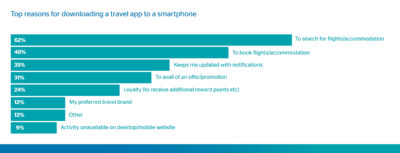
Why users download an app
Travel activities preferred via apps and web
When it comes to check-in and boarding passes it doesn’t come as much of a surprise that apps are the favourite choice but things start to get interesting when you compare apps and web for travel search and booking. 58% of people prefer to use apps for searching for flights and 53% prefer apps to search accommodation, with a close run race for who wins out for booking.
Web, on the other hand, wins out being the preferred choice when it comes to car rental and destination bookings.
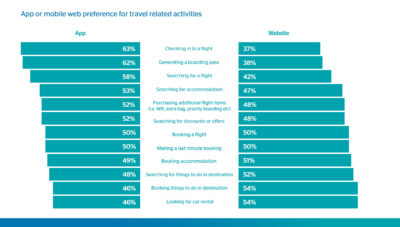
Why users choose an app versus mobile web
Push notifications offer a mix of opportunities to delight and monetize
Further insights revealed that the power of push notifications are not waning with travelers finding trip specific push notifications and promotional offers useful. Today, travel push notifications are mainly delivered via native apps and the mobile web does not offer that level of engagement with consumers.
In fact, mobile apps are increasingly being viewed as engagement platforms, given their ability to interact with consumers throughout the trip. These engagement points vary, from prompting them to book via a discounted offer to notifying them of delays or gate changes, sending contextual at-destination information and driving usage post-booking with loyalty updates.
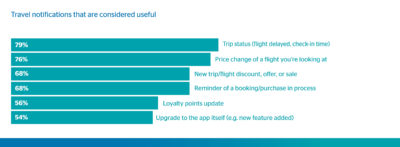
Which notifications travelers find useful
Great UX = Great loyalty. Bad UX = Bad loyalty
Customers these days are extremely savvy. So it’s important to note that any old mobile experience won’t do — having a 1- or 2-star rated app is basically a death sentence for an app.
Travelers value UX highly: 85% say they would be more likely to book a trip with a brand that had a good user experience. Conversely, if they had a bad app experience, 69% would be unlikely to book with that brand again.
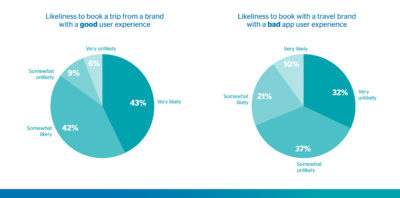
User experience matters
Travel brands investment in mobile makes sense
We wanted to see how travel brands we’re responding to the shift to mobile and apps, so we interviewed 55 senior travel industry professionals to gauge their plans for 2018.
90% of those we spoke to said they were investing in mobile this year and 60% of travel brands are looking to enhance or replace their app this year.
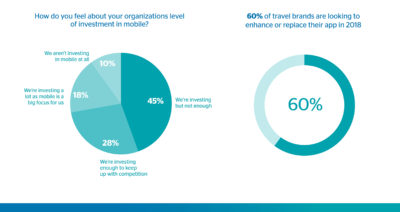
Are organizations investing enough in mobile?
The travel sector has often led the way in improving mobile experiences so that level of intent to invest comes as no major surprise.
But if you’re reading this and your travel company doesn’t have an app, it’s worth noting that some of your competitors most likely have an app in the marketplace, they’ll be investing more in new features this year to drive engagement, and more than likely, they will be winning more of your customers this year too.
Travelers are spending more time and more money on apps. They have come to expect a fast, frictionless, helpful experience when they search and book their travel when they prepare to take off, when they’re in destination and when they return home.
To quote my pal Shania, “So you got the moves but have you got the touch?” The brands that can deliver that end-to-end engagement will win.
Opinions and views expressed by all guest contributors do not necessarily reflect those of tnooz, its writers, or its partners.
Photo by Rahul Chakraborty on Unsplash
![]()

